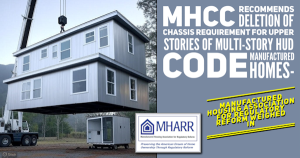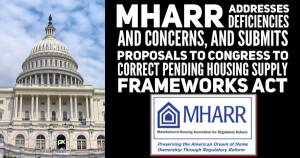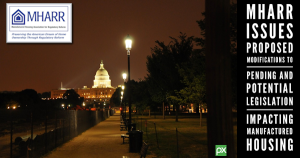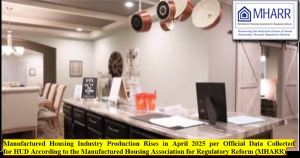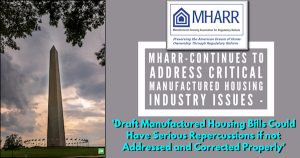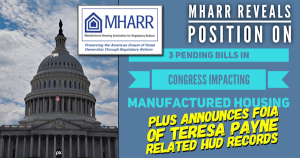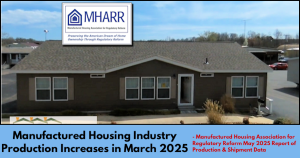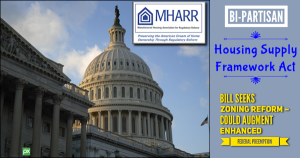[vc_row][vc_column][vc_column_text]
Washington, D.C., February 12, 2018 – The Manufactured Housing Association for Regulatory Reform (MHARR), in a February 6, 2018 communication to the Chairmen and Ranking Members of the Senate Banking Committee and the House Financial Services Committee (copy attached), has called on Congress to intervene in order to ensure the proper, timely and robust implementation of the Duty to Serve Underserved Markets (DTS) mandate as a statutory remedy for the failure of the Government Sponsored Enterprises (GSEs) to properly serve manufactured housing consumers over the course of decades. Citing excessive delays, inadequate progress and continuing institutional resistance by Fannie Mae, Freddie Mac and their federal regulator, the Federal Housing Finance Agency (FHFA), to the market-significant implementation of the DTS directive of the Housing and Economic Recovery Act of 2008 (HERA), the MHARR communication seeks both congressional oversight and full accountability for these entities.
Nearly ten years after the DTS mandate was enacted by Congress, the erstwhile DTS “implementation” plans produced by Fannie Mae and Freddie Mac, and approved by FHFA in late 2017, would delay for at least another three years, any possible market-significant securitization or secondary market support for the personal property (i.e., chattel) loans which comprise 80% or more (and a growing proportion) of all manufactured housing purchase loans, and provide consumer financing for the industry’s most affordable homes. Instead, the long-delayed and wholly inadequate DTS “implementation” plans call for purchases of little more than 1% (i.e., 2,800 to 4,000) of the approximately 230,000 new manufactured home chattel loans expected to be originated between 2018 and 2020, with no impact whatsoever in expanding the availability of the nation’s most affordable source of non-subsidized homeownership for moderate and lower-income American families at a time of nearly record-high demand and need for quality, affordable housing.
In addition to failing millions of American homebuyers in need of affordable, non-subsidized homeownership opportunities, the supposed DTS implementation plans also fail the traditional core of the American manufactured housing industry – thousands of smaller businesses, including manufacturers, retailers, communities, installers, finance providers, transporters and others – that will not see any appreciable increase in either production, sales, financing, or related economic activity for the indefinite future, as a result of DTS plans that provide only for grudging, de minimus involvement with the vast bulk of the manufactured housing market (which Fannie Mae and Freddie Mac have previously made quite clear that they have no interest in) in direct defiance of Congress. Indeed, what precious-little new manufactured housing support activity is, in fact, provided by the FHFA-approved DTS implementation plans, appears to be directed primarily to the industry’s largest businesses, their corporate affiliates and other related beneficiaries. Simultaneously, the supposed DTS implementation plans demonstrate a remarkable degree of continuing coordination between Fannie Mae, Freddie Mac and representatives and affiliates of those various entities which will give those parties – with an interest in maintaining higher-cost interest rates++ – direct input into the future implementation (if any) of DTS with respect to the bulk of the HUD Code market.
As formulated by the Enterprises and as approved by FHFA, therefore, the final DTS “implementation” plans for 2018-2020 totally fail to meet the prime objectives of the DTS mandate to: (1) remedy decades of the Enterprises’ failure to serve the HUD Code affordable housing market; and (2) to end discrimination by Fannie Mae and Freddie Mac against the low, lower and moderate-income manufactured homebuyers that their charters require them to serve.
Even worse, as MHARR’s communication emphasizes, activity now appears to be underway to potentially divert whatever minimal manufactured housing support is provided by the Fannie Mae and Freddie Mac DTS plans to a proprietary “new class” of manufactured home being promoted by the largest industry conglomerates, “priced above [the] current industry average and up to $220,000” per home. Aside from conceivably diverting DTS or other forms of GSE-supported manufactured home loans away from mainstream, affordable manufactured homes to a new “class” of higher-cost homes that does not yet exist — at a much higher price-point that would be beyond the means of many lower and moderate-income Americans — this activity would be highly prejudicial to smaller industry businesses, while functioning to segregate the industry between the “new class” of larger, more costly homes and traditional, lower-cost, affordable manufactured homes, which inevitably would be relegated back to the status of “trailers,” an image that the industry has worked hard to reverse for decades. This activity has thus generated confusion, chaos and a host of serious questions that must be answered and clarified.
In Washington, D.C., MHARR President and CEO, Mark Weiss, stated: “The DTS mandate was a major step by Congress to ensure the availability of competitive financing for America’s most affordable, non-subsidized homes. For a decade, though, this critical remedy for a key failure by the GSEs to fulfill their fundamental mission, has been buried in a bureaucratic morass by Fannie Mae, Freddie Mac, FHFA and others with an interest in preserving the unacceptable status quo. And now, even the DTS “final plans” approved by FHFA raise more questions than they answer. The time has thus arrived for Congress to take remedial action to ensure competitive financing for affordable manufactured housing and to demand both public accountability and complete answers for the confusion and chaos that Fannie Mae and Freddie Mac have created regarding DTS.”
The Manufactured Housing Association for Regulatory Reform is a Washington, D.C.-based national trade association representing the views and interests of independent producers of federally-regulated manufactured housing.


[/vc_column_text][/vc_column][/vc_row]




